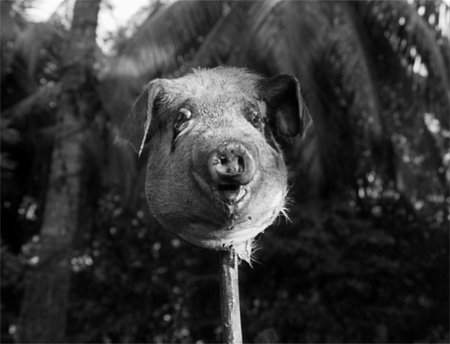
 We have just treated the fact that when a father dies, the eldest son was responsible of his family and the future of his sisters. This is the frame in Twelfth Night. Viola and Sebastian are a pair of twins who have no more family than themselves. Both travel in a ship which is sunk by a storm and because of it, they are separated. Viola arrives to the land of Orsino and decides to “become” her brother because, if not, she hardly will survive: job was limited to men so, for Viola, being her brother is the only way of achieving it.
We have just treated the fact that when a father dies, the eldest son was responsible of his family and the future of his sisters. This is the frame in Twelfth Night. Viola and Sebastian are a pair of twins who have no more family than themselves. Both travel in a ship which is sunk by a storm and because of it, they are separated. Viola arrives to the land of Orsino and decides to “become” her brother because, if not, she hardly will survive: job was limited to men so, for Viola, being her brother is the only way of achieving it.
Shakespeare took the question of sex in a very ambiguous way since, apparently, there are no physical differences between Viola and Sebastian. The characters don’t notice that Cesario (Viola in disguise) is a woman, and this has become a very controversial issue among critics. Viola, as a woman, feels upset because of her brother’s death, but as a man, she has to learn how to behave and even how to think about woman issues.
– Father-daughter: In this patriarchal society, a daughter was seen as an object that the father gives to the future husband. Girls were not normally heiresses of their fathers’  possessions because male children had priority. However, a great exception for this tradition was the Queen herself. Many marriages were a convenience for the families. Women had no power to decide by themselves and had to be obedient. Normally, a father looked for a rich and powerful man in order to improve the status of the family with the marriage. This is the case of Hermia in A Midsummer Night’s Dream. Egeus wants her to be married with Demetrius and tries to abuse of his power because of Hermia’s disobedience:
possessions because male children had priority. However, a great exception for this tradition was the Queen herself. Many marriages were a convenience for the families. Women had no power to decide by themselves and had to be obedient. Normally, a father looked for a rich and powerful man in order to improve the status of the family with the marriage. This is the case of Hermia in A Midsummer Night’s Dream. Egeus wants her to be married with Demetrius and tries to abuse of his power because of Hermia’s disobedience:
Consent to marry with Demetrius,
I beg the auncient priuiledge of Athens:
As she is mine, I may dispose of her:
Which shall be, either to this gentleman,
Or to her death; according to our lawe,
Immediatly prouided, in that case
In the case of Baptista Minola, the father of Katherina and Bianca in The Taming of the Shrew, he is not for cing her daughters to marry a concrete man but he doesn’t allow Bianca to be married until Katherina, the eldest sister considered the shrew, finds a husband.
Gentlemen, importune me no farther,
For how I firmly am resolu d you know:
That is, not to bestow my yongest daughter,
Before I haue a husband for the elder:
If either of you both loue Katherina,
Because I know you well, and loue you well,
Leaue shall you haue to court her at your pleasure.
– Siblings: As we have mentioned before, children were not in equal position within a family. 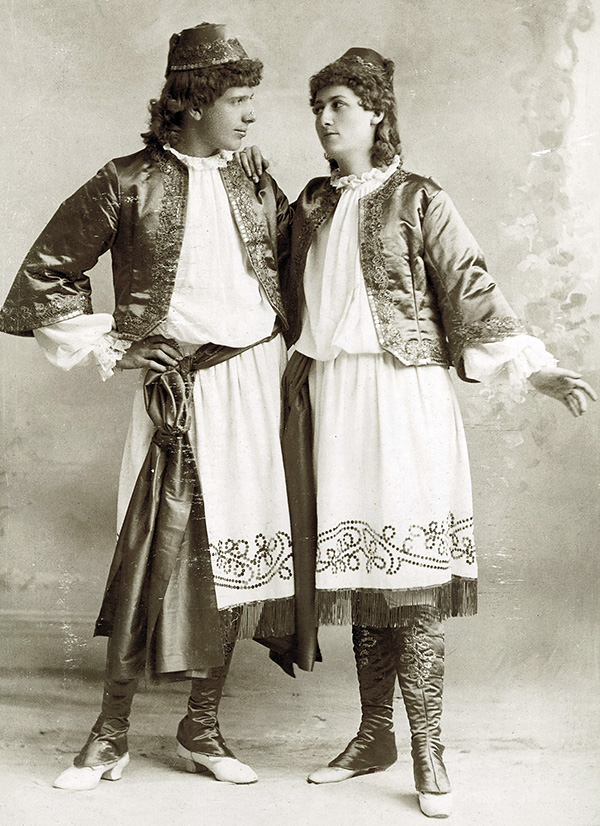 The eldest son was the heir and if the father died, he became the head of the family and ruled it. In this case, brothers had the responsibility of looking for a good husband for their sisters and take care of them until they got married. This is the situation we find in Twelfth Night. Sebastian is supposed to take care of Viola, because they have no parents. Curiously enough, they only allude to the figure of their father, so we can understand how the patriarchal society suppressed the importance of women even in the family.
The eldest son was the heir and if the father died, he became the head of the family and ruled it. In this case, brothers had the responsibility of looking for a good husband for their sisters and take care of them until they got married. This is the situation we find in Twelfth Night. Sebastian is supposed to take care of Viola, because they have no parents. Curiously enough, they only allude to the figure of their father, so we can understand how the patriarchal society suppressed the importance of women even in the family.
– Marriage: After the wedding, the woman became her husband’s property and she had to accept the housewife’s duties 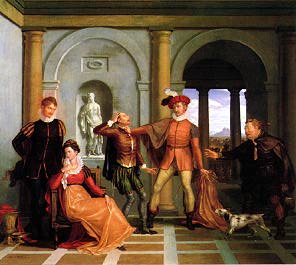 and her husband’s decisions. We cannot forget that, at that time, a husband had a lot of power over his wife and he even had the right to beat her. Shakespeare showed a bit of this situation in his plays. If we pay attention to The Taming of the Shrew we can consider misogynic the way in which Petruchio treats Katherina. This behavior was supposed to be the tool to get the “taming” of the “shrew”, turning Katherina into a submissive woman.
and her husband’s decisions. We cannot forget that, at that time, a husband had a lot of power over his wife and he even had the right to beat her. Shakespeare showed a bit of this situation in his plays. If we pay attention to The Taming of the Shrew we can consider misogynic the way in which Petruchio treats Katherina. This behavior was supposed to be the tool to get the “taming” of the “shrew”, turning Katherina into a submissive woman.
Although we are more interested in the way William Shakespeare depicted the relationship among men and women, we cannot analyze it without taking into account both, men and women individually. Therefore, we have to pay attention to the behavior of the different characters in the different situations in which they are presented.
If we pay attention to male characters, we discover that they are quite similar to the social reality of the Elizabethan time. As different examples of that we have the figure of Theseus (A Midsummer Night’s Dream) as the political representative of the patriarchal society in which women were powerless in front of the male authority, or the figure of Baptista Minola (The Taming of the Shrew) who represents the father’s dominance over his daughter as well as the traditional ideas of the time when he doesn’t allow Bianca to marry until Katherina gets married. We can say that men are the most realistic elements in Shakespearean comedies since they follow the social stereotyped pattern of what a man is supposed to be and behave.
 Female characters, instead, are quite different from reality. They are not submissive from the very first moment. They try to challenge male’s authority in order to be free enough to decide their own destiny: Hermia doesn’t want to marry Demetrius (the one chosen by her father) but her beloved Lyssander, and Katherina is catalogued as a “shrew” because of her bad temper instead of being sweet and submissive as a woman was supposed to be at this time. This behavior is the fact which provokes the conflict and the comical situation that is developed through the whole play. In a real situation, a woman could not behave in this way because it was considered even a break of law. Women had no political power and they couldn’t own anything. In fact, they neither own themselves. That’s why female characters are so innovative in Shakespeare: he gave them voice and power to change their destiny in his plays.
Female characters, instead, are quite different from reality. They are not submissive from the very first moment. They try to challenge male’s authority in order to be free enough to decide their own destiny: Hermia doesn’t want to marry Demetrius (the one chosen by her father) but her beloved Lyssander, and Katherina is catalogued as a “shrew” because of her bad temper instead of being sweet and submissive as a woman was supposed to be at this time. This behavior is the fact which provokes the conflict and the comical situation that is developed through the whole play. In a real situation, a woman could not behave in this way because it was considered even a break of law. Women had no political power and they couldn’t own anything. In fact, they neither own themselves. That’s why female characters are so innovative in Shakespeare: he gave them voice and power to change their destiny in his plays.
Women are the centre of Shakespeare’s comedies since they are related to the concepts of light and life. They drive the comedy and fight until they get the happy ending.
For us, a comedy is the kind of narrative which takes us from an initial conflict to a happy ending with humorous elements. During the Elizabethan Era, the concept of comedy changed from what it had been before. The Renaissance brought with it new ideas and rescued some classical characteristics. However, Shakespeare’s comedies had innovative elements and peculiar characteristics.
Normally, a Shakespeare’s comedy is divided in five acts in which the pattern “from chaos to order” is developed. Usually, there is a main plot and one or two subplots that help to the well development and happy ending of the main one. If we take into account the three comedies which we are working on, we can see how each of them are divided following this pattern. On the same way, we can distinguish love as the main theme and, in some occasions as in A Midsummer Night’s Dream, the presence of supernatural elements. In the three works, there is a happy ending as a conclusion when a new order after the conflict provoked by mistakes and confusion is restored.
Analyzing William Golding we can find many more issues than those we have explained above, but as well as war works as a general background, the concept of human being is explored as an element which everything seems to float around.
In Free Fall or in Pincher Martin we discover humans in extreme situations. We can feel sympathy for them and in this way we are able to see the human response to these extreme situations. However, a question rises on our brains: how can other humans make this to their similar? Why are some humans bad creatures?
The case of The Spire is quite clear: the ambition of the cathedral’s dean in the construction of the cathedral is condemning him from the very first moment. It is curious the fact that Golding uses the symbol of a spire because symbolically this kills the main character: The spire of ambition kills him.
Nevertheless, it is in The Lord of the Flies where we found the stronger criticism to the human being. Early in the novel, the children start to talk and be afraid of a supposed “beast”. They don’t know what is it, but they feel panic when somebody refers to it. Just one of the boys is able to discover the essence of the beast: Simon. He discovers that “the beast” are themselves, that is their own creation, that it doesn’t exist physically but psychologically. Despite of this, he is not able to tell his discover to the other children because they kill him. Even Piggy participates in this assassination. This reveals what Golding thought about the war, about the beast: the war was a consequence of humans’ inner beast.
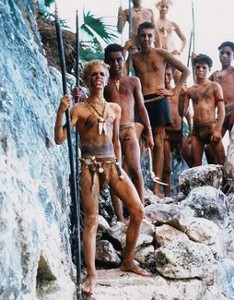 Since now, we have seen how William Golding used his works as a way of criticising some situations in the society. As we have presented, the war seems to be a general background for almost all of Golding’s fictional novels. But he goes a little bit further since he also uses literature in order to give a critical point of view about the politics of his time. In The Lord of the Flies it is quite evident that both groups of children represent the both parts implicated in the Second World War: the allies and the axis. Ralph, as a representative of Democracy is hunted by Jack and the other children. This is the way in which Golding uses the microcosm he has created for this novel to draw through words the cruelty which he has seen during the war. This is the weapon he uses to criticise the pain and damages that the war causes not only to the population and cities, but also to the government systems, which were thought to be weak and impotent against the political beast: the fascism.
Since now, we have seen how William Golding used his works as a way of criticising some situations in the society. As we have presented, the war seems to be a general background for almost all of Golding’s fictional novels. But he goes a little bit further since he also uses literature in order to give a critical point of view about the politics of his time. In The Lord of the Flies it is quite evident that both groups of children represent the both parts implicated in the Second World War: the allies and the axis. Ralph, as a representative of Democracy is hunted by Jack and the other children. This is the way in which Golding uses the microcosm he has created for this novel to draw through words the cruelty which he has seen during the war. This is the weapon he uses to criticise the pain and damages that the war causes not only to the population and cities, but also to the government systems, which were thought to be weak and impotent against the political beast: the fascism.
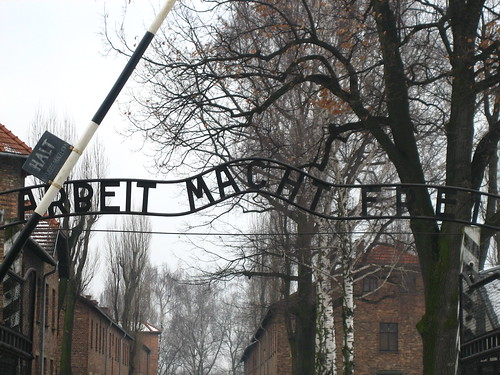 Another impacting work in which politics are clearly involved is Free Fall. Here we can see the cruelty of the concentration camps in Germany and the criticism Golding implies in his writing. Here the main character is arrested and retained and this situation provokes in him a feeling of despair and anxiousness. Maybe in this novel, what Golding wants is to make people think about how a victim of the concentration camps felt. He invites us to think over as well as Sammy does, looking into ourselves and deciding which kind of persons are we.
Another impacting work in which politics are clearly involved is Free Fall. Here we can see the cruelty of the concentration camps in Germany and the criticism Golding implies in his writing. Here the main character is arrested and retained and this situation provokes in him a feeling of despair and anxiousness. Maybe in this novel, what Golding wants is to make people think about how a victim of the concentration camps felt. He invites us to think over as well as Sammy does, looking into ourselves and deciding which kind of persons are we.
The question of freedom is implied here: how much free is a person? In the case of the children, much freedom provokes the chaos because they don’t know how to rule themselves. In the case of Sammy, is the lack of it the fact that provokes all the flashes we are presented from the character’s mind. In times of war and post-war, freedom is an essential element, not only physically but also intellectually and psychologically. That is why we already know from the very beginning that characters like Piggy and Simon are condemned to die: they are not free to express themselves under Jack’s control of the isle.




